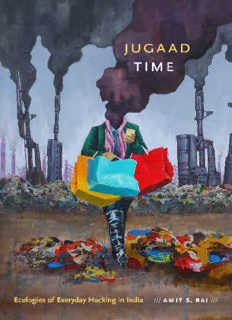
Jugaad Time: Ecologies of Everyday Hacking in India PDF
Preview Jugaad Time: Ecologies of Everyday Hacking in India
jugaad time /// ANIMA Critical Race Studies Otherwise A series edited by Mel Y. Chen and Jasbir K. Puar jugaad time Ecologies of Everyday Hacking in India /// AMIt S. RAI /// Duke University Press Durham and London 2019 © 2019 Duke University Press All rights reserved Printed in the United States of America on acid- free paper ∞ Designed by Courtney Leigh Baker Typeset in Warnock Pro and Scala Sans Pro by Copperline Book Services Library of Congress Cataloging- in- Publication Data Names: Rai, Amit, [date] author. Title: Jugaad time : ecologies of everyday hacking in India / Amit S. Rai. Description: Durham : Duke University Press, 2018. | Series: ANIMA | Includes bibliographical references and index. Identifiers: lccN 2018027897 (print) lccN 2018037764 (ebook) ISbN 9781478002543 (ebook) ISbN 9781478001102 (hardcover : alk. paper) ISbN 9781478001461 (pbk. : alk. paper) Subjects: lcSh: Technological innovations—Social aspects—India. | Economic development—Social aspects—India. | Digital media—Social aspects—India. | Technology—Social aspects—India. Classification: lcc hc440.t4 (ebook) | lcc hc440.t4 R34 2018 (print) | ddc 338/.0640954—dc23 lc record available at https://lccn.loc.gov/2018027897 Cover art: The 6th Floor Collective, untitled landscape from the series “we’re lovin’ it,” 2017. Acrylic on canvas, 100 × 160 cm. Image courtesy of the artists. To my mother, Meera Mukherjee Rai, 1939 – 2015 This page intentionally left blank Contents Preface ix Acknowledgments xix Introduction. A Political Ecology of Jugaad 1 FAbleS oF the ReINveNtIoN I Toward a Universal History of Hacking 39 /// 1 /// The Affect of Jugaad: “Frugal Innovation” and the Workaround Ecologies of Postcolonial Practice 45 /// 2 /// Neoliberal Assemblages of Perception and Digital Media in India 68 FAbleS oF the ReINveNtIoN II New Desiring Machines 102 /// 3 /// Jugaad Ecologies of Social Reproduction 106 /// 4 /// Diagramming Affect: Smart Cities and Plasticity in India’s Informal Economy 128 FAbleS oF the ReINveNtIoN III A Series of Minor Events 150 Conclusion. Jugaad Jugaading: Time, Language, Misogyny in Hacking Ecologies 153 Notes 167 References 175 Index 203 Preface A well- performed jugaad (hack) never fails to bring half- admiring, half- disapproving, and half- curious (it doesn’t add up!) smiles to people’s faces. Following what William James once said of fear and running, we smile before we admire. There is a certain intuition of the porosity of connec- tivity with the world that jugaad practice activates and makes ecological, even joyous. Today, perhaps uniquely in history, jugaad is a joyous pas- sion. What is the time of that proleptic smile? It is, strictly speaking, the duration of a certain passage from affection to affection: jugaad’s affective passage. Where are the spaces of and for jugaad practices? They oper- ate within and against the plasticity — both neural and spatial — of India’s “smart cities.” Together, these space- times, plastic and durational, express the variable powers of emergent properties of nonlinear but feedbacked assemblages of affect, matter, policy, culture, biology, perception, value, force, sensibilities, practices, and discourses. Jugaad, as a practice of post- colonial practical reason and in its very timeliness, forms one way into and out of these assemblages. This book emerged out of the changing political and personal land- scapes shaping a set of collaborative researches into the politics of neolib- eral technologies in India, the UK, and the US. In September 2010 I left a tenured position in an English department at a large state university in the US to take up a position as Lecturer in New Media and Communica- tion at a then left- leaning business school in London. By then I had just finished a year- long research project on gender dynamics in India’s fast- growing mobile phone ecologies, focusing on how to pose effectively ques- tions of embodiment and perception in the contexts of cultures of pirated workarounds (jugaad) in digital technologies. Developing the concept of
Description: